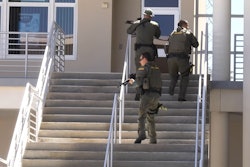Early last month, all members of the University of Virginia (UVA) Police Department began enrollment in three new courses—delivered in 30-minute increments once a month for a full year—aimed at developing greater understanding and awareness among participants in hate crime identification, particularly related to the LGBTQ+ community.
According to WSET-TV News, the new training for campus police uses "lessons on the history of federal and state hate crime laws with case studies, online hate trends, a conversation with survivors of hate crimes, the student perspective on hate at UVA, and protocol for partnering with the FBI, when necessary."
In 2019, University of Virginia Police Department hired Cortney Hawkins, the first person to fill the role of Diversity, Inclusion, and Equity and Manager at the agency. In her role, Hawkins has been tasked with the development of diversity, inclusion, and equity programs "in support of the police department's overall efforts to serve the University and community," according to the UVA website.
The new six-hour training requirement for UVA police officers falls under that mission and under Hawkins' purview.
A Unique Approach
A more diverse law enforcement workforce has been a topic of discussion for decades and was amplified in recommendations made in the 2014 Task Force on 21st Century Policing during the Obama Administration.
Following the issuance of that report, the DOJ and the U.S. Equal Employment Opportunity Commission (EEOC) launched a program called Advancing Diversity in Law Enforcement. The EEOC described this as "an interagency research initiative designed to help our nation's law enforcement agencies recruit, hire, retain, and promote officers that reflect the diversity of the communities they serve."
However, training in "Diversity, Inclusion, and Equity" goes well beyond the well-intentioned effort to hire, train, and retain in the ranks individuals from a variety of ethnic and racial backgrounds.
The term "Diversity, Inclusion, and Equity"—which combines to form the unfortunate acronym "DIE"—addresses somewhat more abstract concepts such as cultural competency, microaggressions, implicit bias, confirmation bias, and others. It involves efforts to achieve deeper understanding (and acceptance) of what makes people different. It implicates intentionality about creating fair access and opportunity for those diverse people. It incorporates initiatives to make those people feel a sense of belonging and value.
Robert Sellers—who serves as the "Chief Diversity Officer" at the University of Michigan—explains that "diversity is where everyone is invited to the party, inclusion means that everyone gets to contribute to the playlist," and "equity means that everyone has the opportunity to dance/experience the music."
Precisely how that translates into the practice of policing and public safety is a little unclear to the uninitiated, but that may be explained—at least in part—in the six-hour course now required of UVA police officers. Then again, perhaps not.
A Unique Atmosphere
"Diversity, Inclusion, and Equity" has become a vogue subset of mandatory workplace culture initiatives throughout the private sector, in part because pressures placed on corporate America by the so-called "woke" socio-political movement. Indeed, corporate America must in many ways yield to the vagaries of changing public opinion—if you want to sell your widgets, the consumer has to like you as a widget maker.
Law enforcement has less straightforward consumer pressure, but that's not to say there's no pressure whatsoever—the "defund" and "de-policing" movements are proof positive of that.
The college campus has a unique atmosphere that is almost universally more "woke" than even the most pliable commercial entities—it's in the college universe where some of these very concepts have been cultivated and grown—so it's unsurprising that this training would begin to take root in police training.
It merits mention that the Universities of Michigan and Virginia are two of only a small handful of university police departments in the United States with a designated "Diversity Manager" position, but that number is expected to grow quickly and substantially.
A Zero-Sum Equation
Any combination of reading, learning, talking, and exchanging ideas to help police better serve the public is a well-worthwhile endeavor. Any training resulting in improved police community relations merits careful consideration.
At the University of Virginia, an allotment of six hours annual training in hate crime identification when dealing with persons identifying as part of the LGBTQ+ community seems to be a reasonable "ask" for officers of the UVA Police Department—as long as those training hours are in addition to, and not in lieu of, other critical training needs.
Time spent doing one thing is necessarily spent NOT doing something else—indeed, time is a zero-sum equation that no manner of "new math" can erase.
















